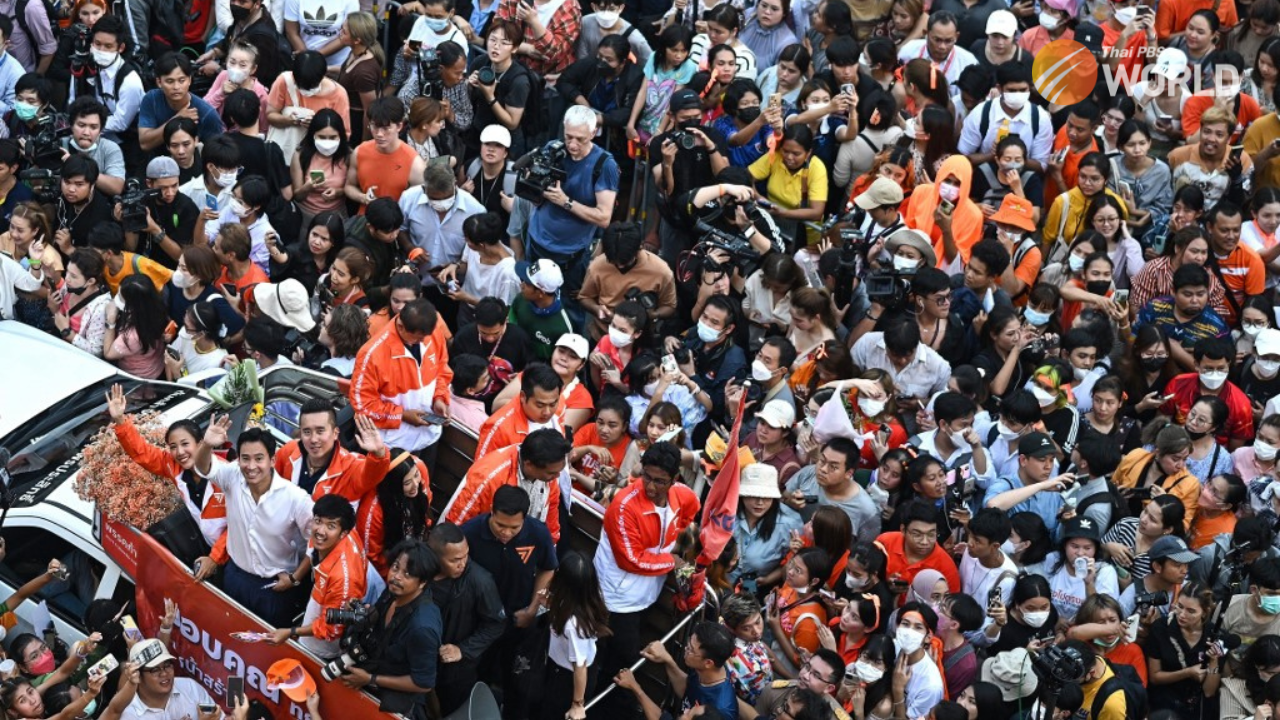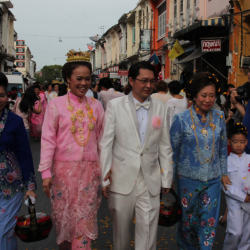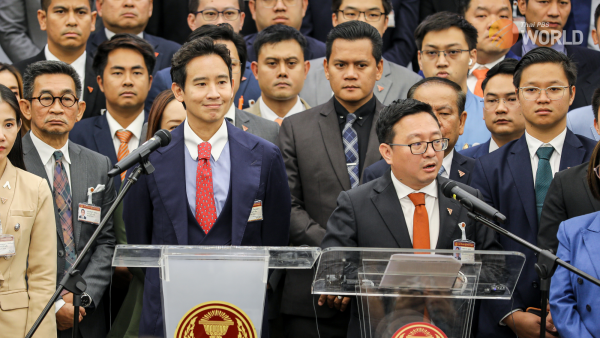How Bangkok set stage for Move Forward’s shock election victory

The Move Forward Party swept Bangkok on Sunday, securing 32 of its 33 constituency seats and laying the foundations for its stunning victory in the general election.
But while that success is truly remarkable, it is by no means unprecedented.
“The results of Bangkok voting remind me of what happened in the 1992 general election after the Black May incident,” said Stithorn Thananitichot, director of the Office of Innovation for Democracy at King Prajadhipok’s Institute. “Back then, the Palang Dharma Party won in all Bangkok constituencies except one, where Democrat Party MP candidate Abhisit Vejjajiva was elected.”
Founded in 1988, Palang Dharma became increasingly popular after its leader Maj General Chamlong Srimuang led a mass protest against coup-makers that resulted in the bloody “Black May” crackdowns by state forces.
Stithorn pointed out that the Move Forward Party, successor to the dissolved Future Forward Party, was also established after a coup, the 2014 military takeover.
Yuttaporn Issarachai, who teaches political science at Sukhothai Thammathirat Open University, said Move Forward’s landslide victory in Bangkok also echoed the achievement of Thaksin Shinawatra’s Thai Rak Thai (TRT) Party in the 2001 election.
TRT was still a new political party but managed to grab 29 out of Bangkok’s 37 MP seats.
A little further back in history, in 1979 Samak Sundaravej’s newly established Thai Citizen Party pocketed as many as 29 Bangkok seats – leaving just one to the Democrat Party and two for the Social Action Party.
Stithorn said that just as before, Bangkok voters on Sunday had handed a landslide victory to the party that had stirred popular fervor ahead of the election.
How did Bangkokians vote?
Voter turnout in Bangkok hit a record level at the 2023 general election, with 74.28% of its 4.47 million eligible voters casting their ballot. Back in 2019, only 72.51% of eligible Bangkok voters exercised their rights. The Bangkok turnout dropped as low as 69.3% back in 2007.
Apart from winning all but one Bangkok constituencies, Move Forward also received the highest number of party-list votes from Bangkokians. More than 1.59 million Bangkok residents, equating 48.25% of those who voted, threw support behind the Move Forward Party.
Coming a distant second was the United Thai Nation Party, which earned 628,938 party-list votes or 19.1% of Bangkok’s total party-list vote. In third spot was the Pheu Thai Party, which was the choice of 18.09% of Bangkok voters or earned 598,776 party-list votes from Bangkokians. The Democrat Party attracted a mere 2.59% of Bangkok party-list votes, while Thai Sang Thai Party earned 1.44%. Next came Chart Pattana Kla with 46,123 party-list votes, followed by Seree Ruam Thai, Bhumjaithai, Palang Pracharath. Thai Pakdee came 10th with just 14,039 votes.
Why the idealistic boy won, and why he has to keep his feet on the ground
Behind Move Forward’s win…
Political observers said Move Forward’s stunning success in Bangkok constituencies was driven partly by former supporters of the anti-Shinawatra PDRC (People’s Democratic Reform Committee).
“They want change. That’s why they rallied behind the PDRC in the past. These people are the progressive minds in the conservative camp,” Stithorn commented.
They also intensely dislike former PM Thaksin Shinawatra, and when Move Forward showed it was not taking sides with the Shinawatra-backed Pheu Thai Party, they felt comfortable voting for this party, he added.
“These voters love the monarchy but they also want change for the better. That’s why they voted for Move Forward.”
Well-known author Sarawut Hengsawad, who writes under the penname “Roundfinger”, commented that Move Forward had worked really hard in opposition and during the election campaign, to the point that even people who disliked it must have noticed its efforts.
“Its debaters also delivered clear messages on stages. Even people of my parents’ generation understand their point. Some of the people who used to hate the party started praising it,” he said.
Many young-generation people also helped promote Move Forward among their older relatives and tried to clear up misunderstandings that the older-generation may have absorbed through fake news or rumors, Sarawut added.
He said social-media users and trends had added to Move Forward’s appeal, along with its ideology memes and fashionable messages.
“People may have been afraid of the Future Forward Party’s bold ideas. But they voted for its reincarnation, Move Forward, this time because they now feel safe to discuss those ideas,” he said. Among those ideas are reform of the military and the monarchy, including the lese majeste (royal insult) law that carries a penalty of up to 15 years in jail.
Disappointed parties
Bangkok voters had not been expected to favor one party, Move Forward, so decisively over all of its rivals on Sunday.
Srettha Thavisin, one of Pheu Thai’s three prime ministerial candidates, could not conceal his dismay.
“I must admit that I was disappointed to see the results of Bangkok voting,” said Srettha, after campaigning hard for months in the capital and elsewhere.
Bhumjaithai Party, which recruited 10 former Bangkok MPs from other political parties, must have been just as disappointed.
Observers pointed out that in terms of votes won, Pheu Thai had not performed much worse than in the 2019 general election. It was just that Move Forward had successfully won the hearts of swing voters. The same phenomenon was also seen in big provinces like Samut Prakan and Phuket.
Conservatives go extinct
The Democrat Party, once the darling of Bangkok voters, has now been dumped altogether in the capital. Its leader Jurin Laksanawisit took responsibility for the bitter defeat by announcing his resignation.
The number of party-list votes the Democrat Party received from Bangkok voters plummeted from 474,836 in the 2019 general election to 85,769 this time around.
The Democrats and Bhumjaithai were not the only government parties to lose out. In fact, no party associated with the conservative camp succeeded in securing an MP seat in Bangkok.
“While the United Thai Nation Party with General Prayut Chan-o-cha as its prime ministerial candidate was the second most popular party in Bangkok’s party-list ballot, it could not translate Prayut’s popularity into a constituency seat,” Stithorn said.
Older voters continued to vote for Prayut because they felt he could represent them, the academic added. But younger voters did not buy his much-touted “Vote for Peace, Vote for Prayut” tagline.
Political families’ power waning?
The Bangkok vote results suggest that political families or individuals can no longer secure wins in their traditional strongholds. Even the well-known Yoobamrung family’s candidate lost out to a youngster from Move Forward.
However, Theerarat Samrejvanich – daughter of a former Bangkok councilor from Lat Krabang district and herself a two-time Pheu Thai MP – managed to score the only win over a Move Forward candidate in the capital. Theerarat won the Lat Krabang constituency seat by the narrowest of margins.
By Thai PBS World’s Political Desk






